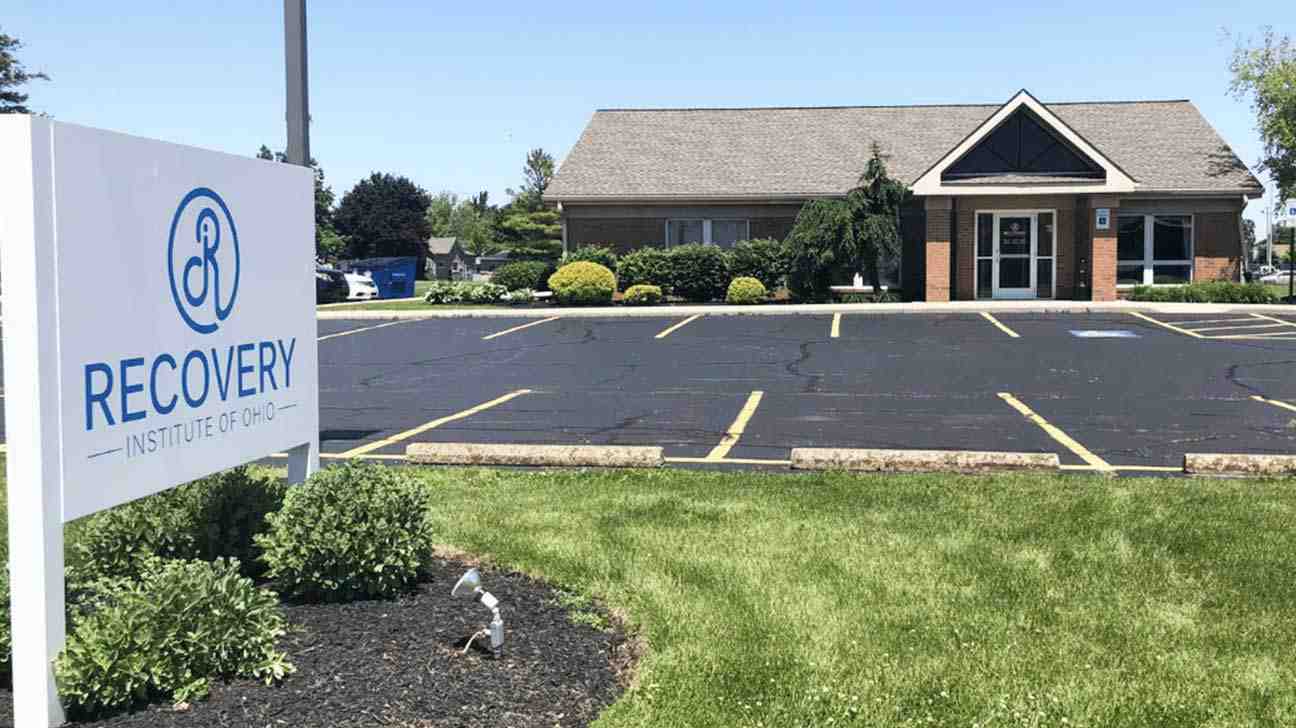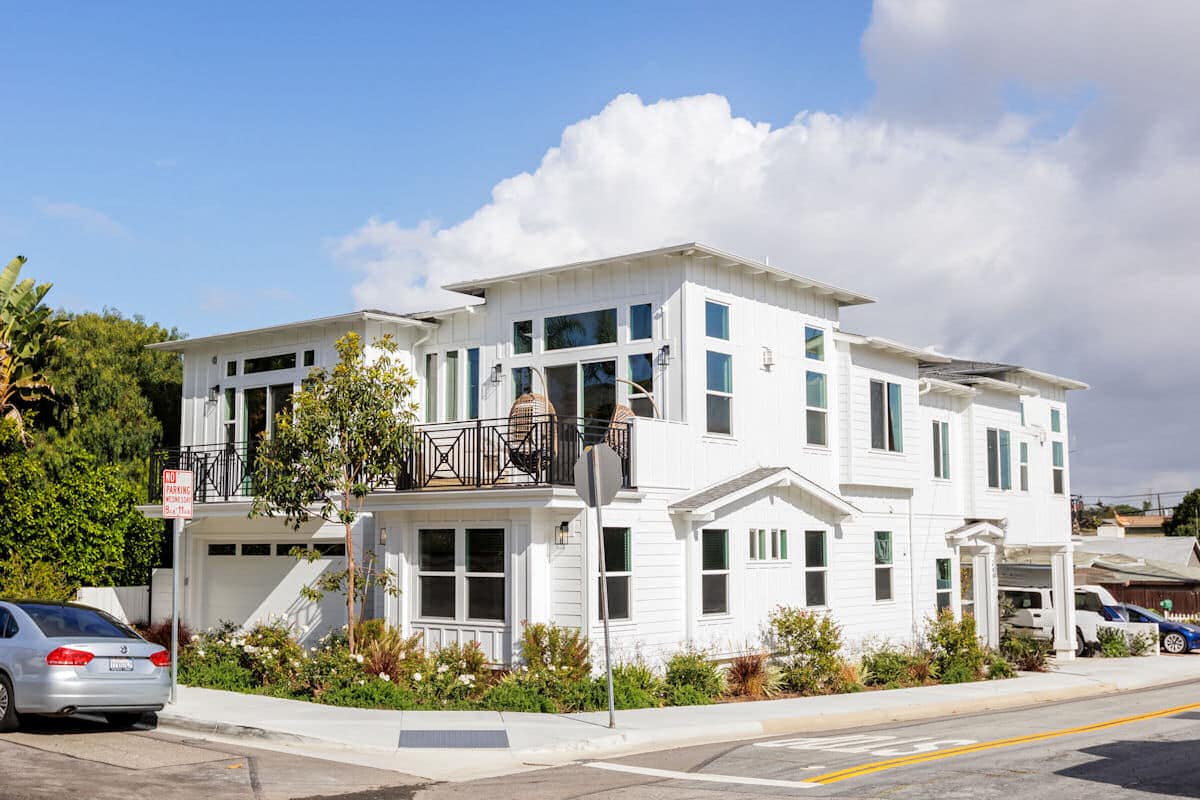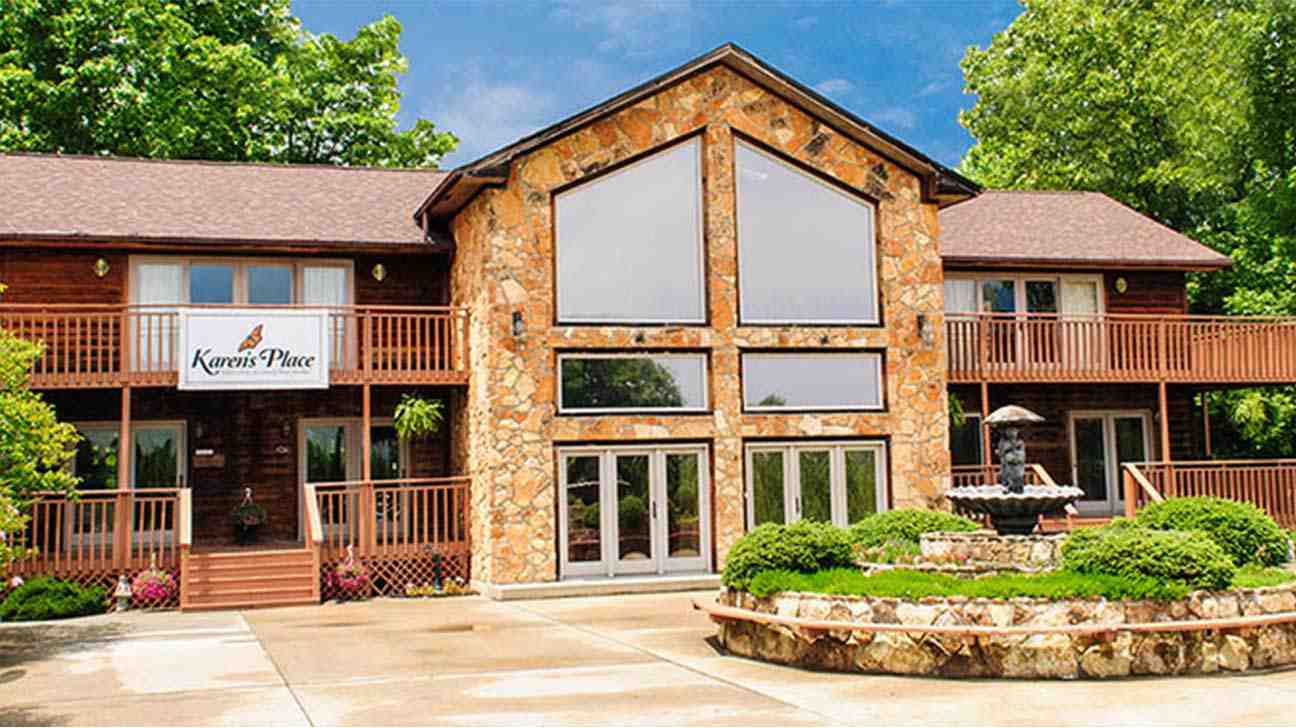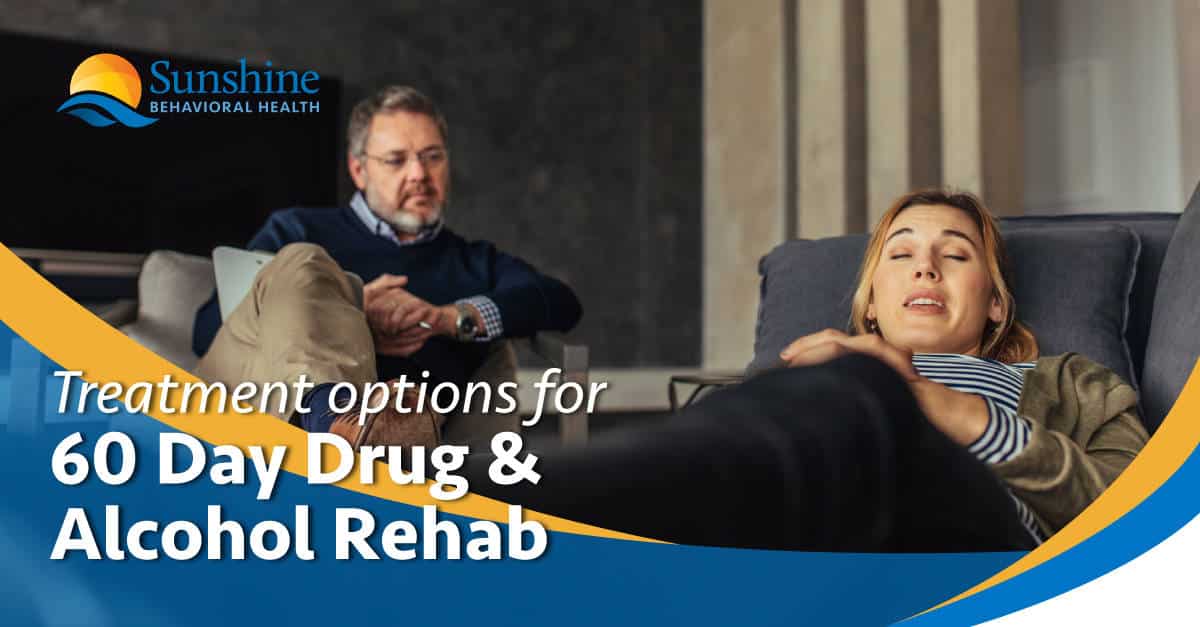
What is a 60-Day Rehab Program and Is It Right for You?
For those searching for a 60 day rehab near me, it’s a two-month treatment program designed to help individuals overcome addiction by offering comprehensive support for lasting recovery.
- What it is: A structured, two-month residential or outpatient program for substance use disorder (SUD).
- Why choose it: It provides more time for deeper healing and skill-building than shorter programs, often leading to better outcomes. It allows for thorough detox, addressing core issues, and aftercare planning, striking a balance between short-term and long-term options.
Finding a 60 day rehab near me is a significant step toward recovery. This program length is ideal for many who need more than a short stay but may not require a commitment of 90 days or more. It helps build a strong foundation for a sober life by allowing enough time to address the complex layers of substance use disorder (SUD).
At Addiction Helpline America, we’ve helped countless individuals find effective addiction treatment, including specialized 60 day rehab near me programs. Our team provides compassionate guidance to connect you with the right resources for lasting recovery.
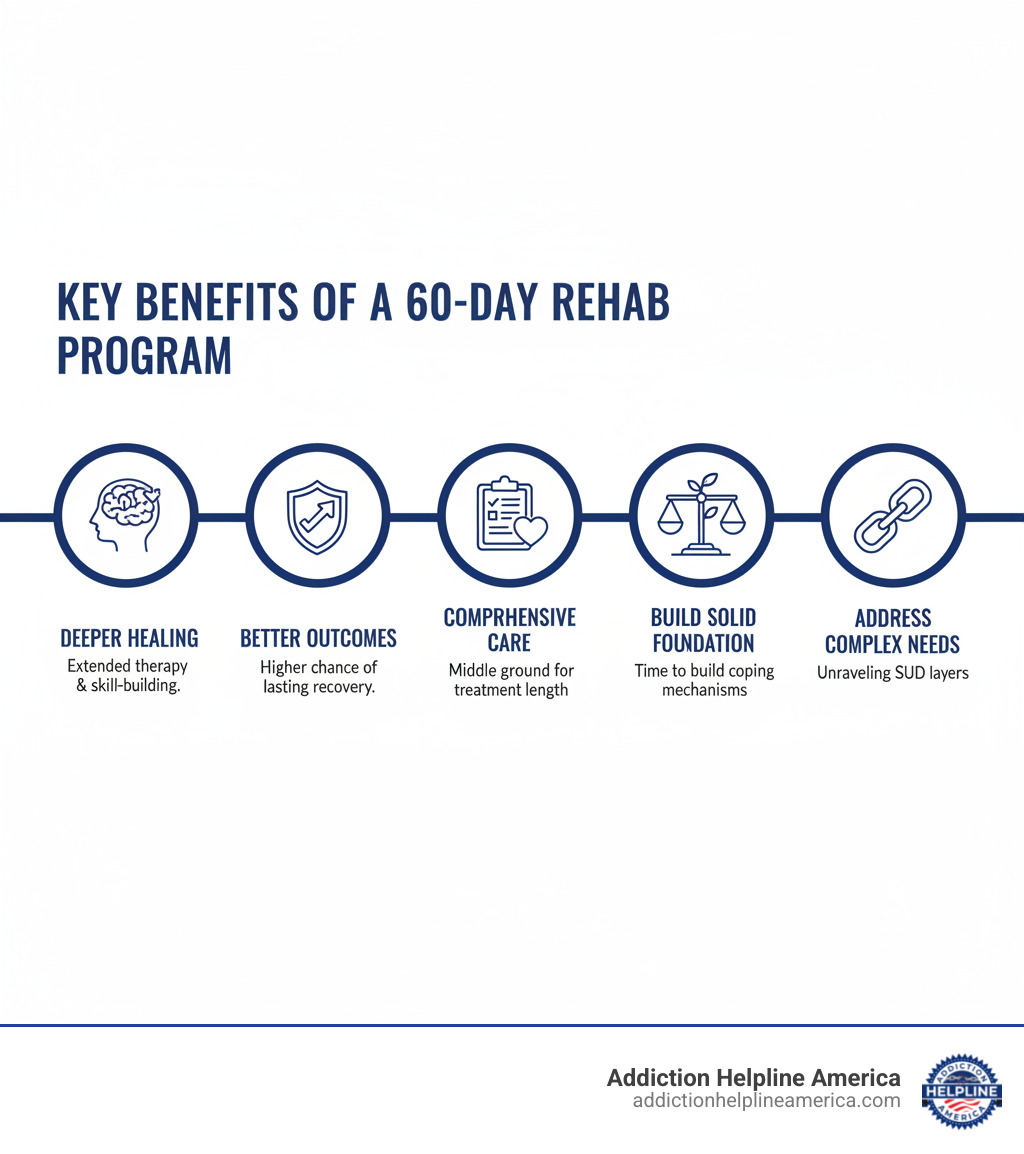
Addiction treatment programs vary in length, but a 60 day rehab near me is designed to provide a more extensive plan than a 30-day program. It offers a deeper dive into the underlying causes of addiction and helps develop robust coping mechanisms. It’s often considered an ideal middle-ground solution, balancing intensive care with practical considerations like time away from work and family.
If you’re neglecting responsibilities, damaging relationships, or facing health problems due to substance use, a 60-day program could be what you need. Our goal at Addiction Helpline America is to ensure you find a program that fits your unique journey toward healing.
The Benefits of a 60-Day Program vs. Other Durations
Choosing the right length of treatment is crucial. A 60-day program often hits the sweet spot, offering distinct advantages over shorter or longer stays.
| Program Duration | Focus & Benefits | Potential Drawbacks |
|---|---|---|
| 30-Day Program | Introduction to treatment; Focus on immediate stabilization; Learn basic coping skills | May not be sufficient for deep-seated issues; Higher relapse risk due to limited time for skill integration; Less time to address co-occurring mental health disorders |
| 60-Day Program | Deeper exploration of addiction’s roots; Development of robust coping strategies; Time for neurological healing post-detox; More comprehensive therapy (individual, group, family); Better integration of new behaviors; Stronger foundation for aftercare | Requires a longer commitment away from daily life; Higher cost than 30-day programs; Still may not be enough for severe, long-standing addictions |
| 90-Day+ Program | Most intensive and comprehensive treatment; Longest duration for deep-seated issues and co-occurring disorders; Strongest foundation for sustained recovery; Allows for extended practice of new life skills; Often recommended for chronic relapse or severe SUD | Significant time commitment away from responsibilities; Highest cost; May not be necessary for all individuals |
Studies suggest that extended residential treatment programs tend to produce better client outcomes. The National Institute on Drug Abuse (NIDA) indicates that treatment for fewer than 90 days may limit effectiveness, recommending longer periods for maintaining positive outcomes. This doesn’t mean shorter programs are useless, but a 60 day rehab near me offers a crucial advantage: it provides more time for neurological recovery. After the initial 30 days, the brain begins to heal from the impact of substance use, making individuals more receptive to therapy and skill-building. This extended period allows for deeper healing and skill development, helping you balance recovery with the realities of life outside treatment.
Signs You Might Need a 60-Day Program
If you’re wondering if a 60 day rehab near me is the right path for you, consider these signs:
- Increased Tolerance: Needing more of a substance to get the same effect.
- Withdrawal Symptoms: Experiencing physical or psychological discomfort when you stop using. A 60-day program allows time for safe, medically supervised detox. For more information, see A guide to opiate detox.
- Cravings: Having intense urges for the substance that are hard to ignore.
- Loss of Control: Using more than intended or being unable to cut down or stop.
- Preoccupation with Substance Use: Spending a significant amount of time obtaining, using, or recovering from the substance.
- Neglecting Responsibilities: Substance use is interfering with work, school, or home life.
- Damaged Relationships: Continuing to use despite causing problems with family and friends.
- Health Problems: Using despite knowing it’s causing or worsening a physical or psychological health issue.
These signs align with the criteria for substance use disorder (SUD). If you identify with two or more, a 60 day rehab near me could offer the comprehensive support needed to address your challenges effectively. Our admissions navigators can help you assess your situation and determine the most suitable level of care.
What to Expect: Therapies and Structure in a 60-Day Program
Starting a 60 day rehab near me means entering a structured, supportive environment designed for healing. It’s about understanding the root causes of addiction, developing new coping mechanisms, and building a foundation for a sober life with professional guidance.

Your journey begins with a comprehensive intake assessment to create your individualized treatment plan. For many, this is followed by medically supervised detox, where our team helps you safely and comfortably clear substances from your system. This process is monitored 24/7 to manage withdrawal symptoms. Detox is just the first step; the real therapeutic work begins once you are stable. For more details, you can explore A guide to opiate detox.
Once detox is complete, you’ll settle into a structured daily routine. A typical day in a 60 day rehab near me includes a mix of therapies and activities designed to promote healing and stability. Your schedule will likely include:
- Individual Therapy: One-on-one sessions to explore personal issues and triggers.
- Group Therapy: Sharing experiences and learning from peers in a supportive setting.
- Educational Workshops: Learning about the science of addiction and relapse prevention.
- Holistic Therapies: Activities like yoga, meditation, or art therapy to support overall well-being.
- Life Skills Training: Developing practical skills for managing stress, finances, and relationships.
Importantly, aftercare planning starts on day one. Our team works with you from the beginning to create a solid plan for continued support and sobriety after you complete the program.
Common Therapies and Treatments
A 60 day rehab near me uses a variety of evidence-based therapies to address the complexities of addiction. These are custom to your specific needs.
- Cognitive Behavioral Therapy (CBT): Helps you identify and change negative thought patterns and behaviors related to substance use.
- Dialectical Behavior Therapy (DBT): Focuses on mindfulness, distress tolerance, and emotional regulation, which is especially helpful for those with intense emotions.
- Group Therapy: A core component where you share experiences and build a supportive community, reducing feelings of shame and isolation.
- Individual Counseling: Provides a private space to work one-on-one with a therapist on personal issues and the root causes of addiction.
- Family Therapy: Aims to heal relationships, improve communication, and educate family members on how to support your recovery.
- Holistic Therapies: Includes yoga, meditation, art therapy, and nutritional guidance to promote mind-body balance and stress reduction.
- Medication-Assisted Treatment (MAT): For opioid and alcohol addiction, MAT combines FDA-approved medications with counseling to reduce cravings and prevent relapse. It is a proven, effective tool for recovery.
- Dual Diagnosis/Co-occurring Disorder Care: It’s common for addiction to co-exist with mental health conditions like anxiety or depression. About 50% of people with SUD have co-occurring mental health disorders. A comprehensive program will treat both conditions simultaneously for the best chance at lasting recovery.
60-Day Rehab Program Options
When choosing a 60 day rehab near me, you’ll find two main options: inpatient and outpatient. The right choice depends on your individual needs.
Inpatient 60-day rehab (residential treatment) requires you to live at the facility. This provides a 24/7 structured environment away from daily triggers, allowing for immersive care with constant medical and clinical support. By removing yourself from your usual environment, you can focus entirely on healing. Learn more about this approach at Inpatient Rehab.
Outpatient 60-day rehab offers more flexibility, allowing you to live at home while attending treatment sessions. This option is ideal for those with a strong support system or as step-down care after an inpatient program. It helps you practice new coping skills in a real-world setting with professional support. For more intensive outpatient care, see our guide on Intensive Outpatient Program.
All program options discussed are available through Addiction Helpline America’s network. We can help you determine which level of care is the best fit for your situation and recovery goals.
How to Find the Best 60 Day Rehab Near Me: 10 Key Factors
Finding the right 60 day rehab near me is a critical step, but you don’t have to do it alone. By focusing on a few key factors, you can make a confident choice for your recovery.

At Addiction Helpline America, we specialize in connecting people with reputable treatment centers nationwide. We can help you steer your options and ask the right questions to find the best fit.
10 Factors to Evaluate When Choosing a 60 Day Rehab Near Me
When evaluating programs, consider these factors to ensure you choose a quality facility:
1. Licensing & Accreditation: Ensure the facility is licensed by the state and accredited by a recognized body like The Joint Commission or CARF. This guarantees the center meets high standards for safety and care.
2. Evidence-Based Therapies: The program should use scientifically proven methods like Cognitive Behavioral Therapy (CBT) and Dialectical Behavior Therapy (DBT) that have demonstrated results in treating addiction.
3. Staff Qualifications: The team guiding your recovery should be composed of experienced, licensed professionals. Ask about the credentials of their therapists, doctors, and counselors.
4. Individualized Treatment Plans: A one-size-fits-all approach doesn’t work. The program should create a personalized plan based on your specific history, needs, and goals.
5. Dual Diagnosis/Co-Occurring Disorder Care: If you’re also dealing with mental health challenges like anxiety or depression, it’s crucial that the facility offers integrated treatment for both conditions simultaneously.
6. Location & Environment: Consider whether you’d benefit more from a quiet, secluded setting away from triggers or a center closer to your home and support system.
7. Aftercare & Alumni Programs: Recovery is a long-term process. Look for programs that offer robust aftercare planning, alumni groups, and other resources to support you after you leave.
8. Family Involvement: Addiction impacts the entire family. Programs that offer family therapy and education can help heal relationships and build a stronger support network for your return.
9. Cost & Insurance Accepted: Be sure to ask for a clear breakdown of the total cost, what your insurance plan covers, and what payment or financing options are available.
10. Patient Reviews & Testimonials: Reading reviews from past clients can provide valuable insight into the quality of care and the overall experience at a 60 day rehab near me.
Questions to Ask an Admissions Counselor
When you call a treatment center, be prepared with questions to ensure it’s the right fit for you. Here are some essential ones to ask:
- What does a typical daily schedule look like?
- What specific therapies and treatments are included?
- What is the staff-to-client ratio?
- How do you treat co-occurring mental health disorders?
- What kind of aftercare planning and support do you provide?
- What is the total cost, and what are my payment options with my insurance?
Our admissions navigators at Addiction Helpline America are ready to answer these questions and help you find a drug rehab near you that aligns with your recovery goals.
Navigating the Cost of a 60-Day Rehab Program
Considering the cost of a 60 day rehab near me is an important step. While it can seem like a significant expense, it’s an investment in your health and future. The long-term cost of untreated addiction—in terms of health, relationships, and opportunities—is almost always far greater.

Costs for a 60-day inpatient program can vary, typically ranging from $20,000 to $60,000 without insurance. Outpatient programs are generally less expensive as they do not include costs for room and board.
Insurance and Payment Options:
Fortunately, there are many ways to make treatment more affordable.
-
Insurance Coverage: The Affordable Care Act and Mental Health Parity and Addiction Equity Act require most health insurance plans to provide coverage for substance use disorder treatment. This can significantly reduce your out-of-pocket costs. Our team at Addiction Helpline America can help you verify your benefits to understand what your plan covers.
-
Medicaid: Many 60 day rehab near me centers accept Medicaid, which can sometimes cover the full cost of treatment for eligible individuals.
-
Payment Plans & Financing: If you have remaining costs after insurance, many facilities offer flexible payment plans or can connect you with third-party financing companies.
-
State-Funded Options: For those with limited financial resources, Addiction Helpline America’s network includes free or state-funded programs. These may have eligibility requirements or waitlists but provide a vital path to care.
Don’t let cost be a barrier to getting the help you deserve. We can help you explore all available options to find a program that fits your budget.
Life After Rehab: Aftercare and Long-Term Sobriety
Completing a 60 day rehab near me is a major accomplishment, but it’s the beginning of your recovery journey, not the end. Life after rehab involves returning to daily life without the 24/7 support of a treatment facility, which is why a strong aftercare plan is essential for preventing relapse.
Transitioning back home means facing old triggers and stressors. Building a robust support network is critical. This includes family, friends who support your sobriety, and peers from your program. Connection is a powerful defense against the isolation that often fuels addiction.
Continued therapy, whether individual or group, helps you manage challenges as they arise. This is especially important for those with co-occurring mental health disorders, as about 50% of people with SUD have co-occurring mental health disorders. Integrated care is an ongoing necessity for maintaining both mental health and sobriety.
For many, sober living homes offer a valuable transition, providing a drug-free environment with peer support and structure while you practice new life skills in a real-world context.
Aftercare Planning and Success Rates for a 60 day rehab near me
Before you leave your 60 day rehab near me, your treatment team will help you create a comprehensive aftercare plan. This is your personalized roadmap for maintaining sobriety.
A strong aftercare plan often includes:
- Support Groups: Groups like Alcoholics Anonymous (AA), Narcotics Anonymous (NA), or SMART Recovery provide invaluable peer support and a sense of community.
- Alumni Programs: Many facilities offer programs to keep you connected to the treatment community through meetings, events, and online groups.
- Continued Therapy: Ongoing counseling helps reinforce coping skills and address new issues that arise in recovery.
Success in recovery is personal and looks different for everyone. While some achieve lifelong abstinence immediately, others may face setbacks on their path. Long-term outcomes depend on your engagement in treatment, the quality of care, your support system, and your commitment to your aftercare plan.
However, statistics show that treatment works. Studies have shown significant reductions in substance use one year after treatment, with some programs reporting that up to 90% of participants reduce their use. These numbers represent real people who have reclaimed their lives.
The initial 60 days build the foundation, but your continued engagement with aftercare is what sustains long-term success. Recovery is an ongoing practice. You can find more information on our More on 60 Day Rehab page and explore different types of treatment programs to understand your options.
At Addiction Helpline America, we’re here for the entire journey. We are committed to helping you access the ongoing support you need to thrive in sobriety.
Your Path to Recovery Starts Here
We know how hard it is to reach out for help. Maybe you’ve been searching for a 60 day rehab near me late at night, wondering if recovery is even possible for you. Maybe you’re scared, exhausted, or just not sure where to turn. We want you to know something important: taking this first step, even just reading these words right now, is an act of courage. And yes, recovery is absolutely possible for you.
A 60 day rehab near me offers something special—it’s long enough to truly heal and learn the skills you need, but it’s also a timeframe that feels manageable when everything else feels impossible. During those two months, you’ll have the chance to understand what’s been driving your addiction, build real resilience, and create a foundation for a life you actually want to live. It’s not magic, and it’s not always easy, but it works.
At Addiction Helpline America, hope isn’t just something we talk about—it’s what we do every single day. Our entire mission is to make finding the right treatment as simple and stress-free as possible. We’ve built a vast network of addiction and mental health treatment centers across the country, and we connect people to them for free. No judgment, no pressure, just personalized guidance from people who genuinely care.
When you reach out to us, you’ll talk to a real person who listens. Our compassionate team will answer your questions, walk you through your options, and help you figure out what makes sense for your unique situation. Everything we discuss is completely confidential. We understand that every person’s journey is different, and we’re here to support yours—whatever it looks like.
Your path to recovery truly starts here, and you don’t have to walk it alone. We’re ready whenever you are.
If you’d like to learn more about what’s available, explore different types of treatment programs to see what might be the best fit for you.
Our helpline is 100%
free & confidential
If you or someone you care about is struggling with drug or alcohol addiction, we can help you explore your recovery options. Don’t face this challenge alone—seek support from us.
Programs
Resources
Will my insurance
cover addiction
treatment?
We're ready to help
Find the best
drug or alcohol treatment
center
Are you or a loved one struggling with addiction? Call today to speak to a treatment expert.






